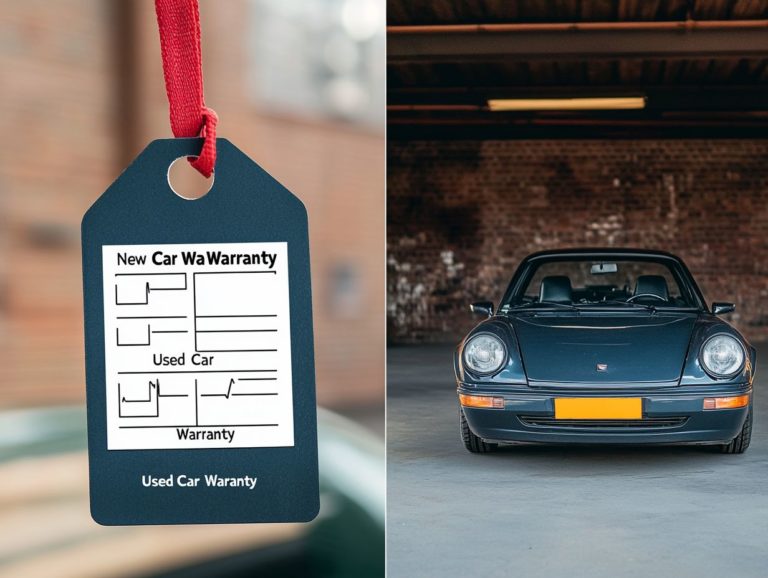5 Essential Tips for Navigating Car Warranties
Navigating the landscape of car warranties might seem daunting, yet grasping the nuances can ultimately save you both time and money.
From the diverse types of warranties available to the often-overlooked fine print containing critical information, it’s vital for you to know what to look for.
Get ready! Here are five essential tips to help you maximize your car warranty. Whether you’re uncertain about what s covered or how to maintain the integrity of your warranty, this resource will provide the clarity you need.
Delve into this article to equip yourself with the knowledge that will lead to a more seamless driving experience.
Contents
- Key Takeaways:
- 1. Understand the Different Types of Warranties
- 2. Read the Fine Print Carefully
- 3. Know What Is Covered and What Is Not
- 4. Keep Up with Maintenance and Service Requirements
- 5. Keep Track of Important Documents
- What Are the Different Types of Car Warranties?
- Frequently Asked Questions
- What are the 5 essential tips for navigating car warranties?
- How important is it to understand the coverage of a car warranty?
- Why is it important to know the duration of a car warranty?
- What should I research about a warranty provider before purchasing a car warranty?
- Why is it important to read the fine print of a car warranty?
- How does keeping up with maintenance requirements affect a car warranty?
Key Takeaways:

- Understand the different types of car warranties to choose the best one for your needs.
- Read the fine print carefully to avoid unexpected exclusions or limitations.
- Know what s covered and what s not, to steer clear of unexpected repair costs.
- Keep up with maintenance and service requirements to avoid voiding your warranty.
1. Understand the Different Types of Warranties
Understanding the various types of warranties is crucial for you as a car owner; it can affect how you protect your car and your financial wellbeing. You’ll encounter a range of warranties, including the manufacturer warranty, which safeguards against defects and issues stemming from the production process.
Then there are extended warranties that provide additional coverage once the factory warranty runs its course. Don t overlook options like maximum care warranties and third-party warranties, each offering unique coverage details and limitations tailored to meet diverse consumer needs and preferences. Familiarity with these options gives you the power to make informed decisions regarding your car maintenance and ownership.
Typically, the manufacturer warranty offers coverage that lasts between three to five years, covering essential components like the engine and transmission while often excluding wear-and-tear parts. Extended warranties, in contrast, can last several additional years, providing you with more flexibility in transferring coverage when you decide to sell the vehicle.
Maximum care warranties usually cover a broader range of components, delivering higher levels of protection, while third-party options can vary significantly in cost and coverage. Some may offer more inclusive plans but come with specific exclusions.
Being aware of these nuances enables you to navigate your warranty choices with greater ease, ensuring your investment is well-protected. For more insights, check out myths about used car warranties.
2. Read the Fine Print Carefully
If you don t check the fine print of your warranty contract, you might miss crucial information about exclusions, limitations, and the overall validity of your vehicle’s coverage.
Neglecting these details can lead to unexpected costs and complications down the road. It s vital for you to grasp the specific conditions under which your warranty remains applicable. Key areas to focus on include stipulations regarding routine maintenance, the types of repairs covered, and any geographic limitations that might apply.
Verifying the steps needed to maintain your warranty’s validity like keeping track of service visits can provide you with peace of mind. Trusted providers are invaluable in this process, offering clarifications and guidance to help you navigate the complex language often found in warranty agreements.
3. Know What Is Covered and What Is Not
Knowing exactly what s included and what s not in your warranty is essential for steering clear of unexpected repair costs and ensuring your vehicle is well-protected throughout your ownership journey.
Typically, warranties cover critical components like the engine and transmission, which can save you a considerable amount on repairs if an issue pops up. However, keep in mind that certain parts, such as tires and brakes, are often excluded, as these usually depend on regular maintenance and may not be covered under standard warranty protections.
Grasping terms like road hazard protection coverage for damage caused by potholes or debris is equally important, as they can impact how claims are processed, especially in cases of accidental damage. In the end, familiarizing yourself with the specifics of your warranty agreement can significantly influence the speed of repairs and the financial ramifications of unexpected breakdowns.
Don’t wait! Learn these tips today to protect your investment. If you have any questions or want to share your experiences with car warranties, feel free to reach out!
4. Keep Up with Maintenance and Service Requirements

Keeping up with maintenance and service requirements is vital for preserving your car warranty, and knowing how to manage multiple car warranties can help you extend your vehicle’s lifespan.
By sticking to regular maintenance schedules and choosing approved repair shops, you not only meet warranty conditions but also improve your vehicle’s performance and safety. This shows a responsible approach to vehicle care, which manufacturers consider when reviewing claims.
Maintain comprehensive records of all service activities. These records provide crucial evidence that you’ve followed necessary procedures. This meticulous documentation strengthens your warranty claims and contributes to your vehicle’s resale value, making it a savvy investment for the future.
5. Keep Track of Important Documents
Keeping track of important documents related to your vehicle warranty greatly enhances your ability to file claims successfully and understand your contract terms.
To ensure a smooth claims process, retain key documents such as the warranty contract and maintenance records that show your commitment to service schedules. Keeping a record of your communications with warranty providers can also clarify terms or help resolve disputes.
Understanding how these documents relate to your claims is critical. Lacking complete documentation can lead to rejected claims. Some repairs require using specific repair shops, so keeping these records organized and easily accessible is essential.
What Are the Different Types of Car Warranties?
Understanding the different types of car warranties is vital for your ownership journey. They offer diverse protection levels that can influence both resale value and your overall driving experience. To ensure you make the most of your warranty, consider these tips for keeping your warranty valid.
Familiarize yourself with factory warranties, extended warranties, and third-party warranties. Factory warranties, typically from the manufacturer, provide comprehensive coverage for a specified period. This protects you and positively affects your vehicle’s resale value, as prospective buyers often prefer cars with remaining factory coverage.
Extended warranties can be purchased separately and offer protection beyond the original terms. If you plan to keep your vehicle for years, an extended warranty is a smart choice. Third-party warranties, while an option, can vary in quality and may not appeal as much to future buyers, potentially lowering your vehicle s market appeal.
By analyzing these options, you can make informed decisions that enhance your investment and provide you with the peace of mind you deserve.
What Should You Look for in a Car Warranty?
When selecting a car warranty, evaluate various options based on coverage details, warranty duration, and the reputation of the providers to ensure comprehensive protection. Additionally, consider 5 ways to maximize your warranty benefits for better value.
Understanding the extent of coverage is crucial. Features like powertrain protection and additional care can significantly affect which repairs are included, so don t overlook them. Consider the warranty duration as well; longer terms often provide peace of mind for those keeping their vehicle for many years.
The credibility of the warranty provider is critical for your customer service experience and claims handling. Research customer reviews and their financial stability to make a more informed decision. Combining these elements will equip you to choose a warranty that optimally safeguards your vehicle.
Start exploring your warranty options today to protect your ride and enhance your investment!
What Are the Common Exclusions in Car Warranties?

Common exclusions in car warranties can easily catch you off guard, often encompassing critical areas like road hazard damage and tire protection. These exclusions can significantly impact your claims and repairs.
Knowing these exclusions is crucial for drivers. It can save you from unexpected costs! Understanding these exclusions is essential for drivers like you, as they can lead to unexpected out-of-pocket expenses when your vehicle needs servicing.
For example, many warranties typically don t cover problems stemming from neglect or improper maintenance, leaving you vulnerable to costly repairs that could have been avoided.
Exclusions for modifications or aftermarket parts can make it harder to file claims. It s vital for you to familiarize yourself with these stipulations to avoid being blindsided by financial pitfalls, empowering you to make informed decisions regarding your vehicle’s care and warranty coverage.
How Can You Make the Most of Your Car Warranty?
Making the most of your car warranty means fully grasping the terms, ensuring you are adhering to required maintenance, and navigating warranty claims with finesse for optimal vehicle protection. For those considering a new vehicle, check out these must-read tips for new car buyers.
To truly maximize your coverage, it s vital to maintain detailed records of all services performed and parts replaced. This can significantly impact claim approvals down the road.
Familiarize yourself with the specific claims processes laid out in your warranty documentation, as these often include crucial timelines and necessary forms to complete.
Talking to customer service can help you understand your coverage options, especially those additional protections that might not be immediately obvious, creating a more robust safety net for your vehicle.
By staying informed and proactive, you can greatly minimize the risk of unexpected expenses.
What Happens if You Miss a Maintenance or Service Requirement?
Overlooking a maintenance or service requirement can put your warranty validity at risk, leading to potential disputes over claims and escalating repair costs.
When you miss those crucial maintenance schedules, manufacturers may argue that any subsequent issues arise from that neglect, leaving you susceptible to unexpected out-of-pocket expenses.
It s vital for you to carefully review your warranty guidelines to grasp the specific maintenance obligations required. If you find yourself having missed a service requirement, documenting your attempts to comply and reaching out to the manufacturer or service provider may help ease complications.
Effective communication can often pave the way for resolving disputes, ensuring that your warranty protections remain intact even if there s a rare slip in following maintenance schedules.
What Documents Should You Keep for Your Car Warranty?
Retaining essential documents related to your car warranty such as the warranty contract and maintenance records from authorized service centers is crucial for ensuring smooth claims and repairs.
These documents provide you with the proof necessary to validate your claims, making the process more efficient and minimizing the likelihood of disputes.
Key items to keep include:
- Receipts for parts and services
- Any correspondence with the warranty provider
- A detailed service history
By keeping your documentation organized and readily accessible, you empower yourself to advocate effectively for your rights and navigate any complexities that may arise during warranty claims. This proactive approach ultimately helps safeguard your investment in your vehicle.
Frequently Asked Questions

The 5 essential tips for understanding car warranties are: understanding the coverage, knowing the duration of the warranty, researching the reputation of the warranty provider, reading the fine print, and keeping up with maintenance requirements.
Got more questions? Don’t hesitate to ask!
How important is it to understand the coverage of a car warranty?
Understanding your car warranty coverage is crucial. It tells you what repairs and services are included, helping you dodge unexpected costs. For more detailed information, check out understanding new car warranties.
Why is it important to know the duration of a car warranty?
The warranty duration indicates how long you’re covered. Knowing this helps you plan for future expenses and be aware of when your warranty expires.
What should I research about a warranty provider before purchasing a car warranty?
Research the warranty provider’s reputation. Check reviews and ratings to ensure they are reliable and honor their commitments.
Why is it important to read the fine print of a car warranty?
The fine print includes vital information like exclusions and costs. Reading it carefully prevents costly surprises later on.
How does keeping up with maintenance requirements affect a car warranty?
Many warranties require regular maintenance to remain valid. Staying on top of these tasks ensures your warranty stays intact and your car runs smoothly.





